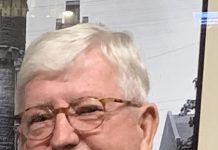By Diana Hadley
The Statehousefile.com
From my 46 years as an educator, I can remember many special moments, but one of the most inspiring was the Red for Ed rally at the Indiana Statehouse last fall. As I walked within a collective red mass of over 17,000 educators and others who came to support public education, I brushed away a few tears as I experienced the positive energy of the professionals I respect so much unified as a force.
No one expected a one-day rally to solve all the problems with education, but it did ignite teacher engagement. Those who attended the rally and many who watched on the news realized this was the moment that teachers served notice. Non-educators should not control education policy.
Currently, the 150 members of the 2020 Indiana General Assembly include some retired educators, but only two working teachers, Rep. Melanie Wright, Daleville Community Schools elementary music teacher, and Rep. Tonya Pfaff, Terre Haute North Vigo High School math teacher.
That number has the potential to increase as 24 educators representing both parties have filed to run for state offices this year—and be elected if thousands of others help them.
Pfaff, elected in 2018, says she isn’t sure what the magic number of teachers added to the current mix of legislators is; but with a major portion of the state budget going to education, more educators are needed to make good decisions.
Wright, a legislator since 2014, says, “We need more teachers here for sure.â€
A few other legislators have kept their teaching jobs and served in the legislature over the years, but it takes commitment, energy, and organization. Rep. Sheila Klinker, a retired teacher from Lafayette, has served in the legislature since 1982 and encourages other teachers who are seeking offices. She gives credit to administrators who encouraged her to manage two important jobs for 38 and 35 years, respectively.
Like Klinker, Wright and Pfaff say they appreciate the encouragement from their administrators to serve in addition to the administrators’ effort to find qualified substitute teachers to provide continuity for their students during the sessions.
In regard to the challenges, both Wright and Pfaff agree there isn’t a financial challenge. The legislative salary makes up for the lost income when they are not teaching.
However, the challenge of running for office while maintaining a full-time teaching job is exhausting. Teachers who become a part of the political process for the first time can be overwhelmed as they work after school hours to manage a staff, organize fundraising and interact with voters at events and door-to-door canvassing necessary for a successful campaign.
John Hurley, a technology teacher from South Spencer High School for 10 years, is running for state representative in District 75.  He is willing to take on this work because he wants to “put public education at the forefront.†But he says he needs volunteers to help with communication, funding, phone banks, and signs as he continues to teach.
Pfaff says being a legislator is not for everyone; many teachers have family circumstances and other responsibilities that make running for office impossible. But those who cannot run themselves can help others who can in many ways that Hurley mentioned, and they must.
Educators provide a wide variety of experiences from preschool through higher education, arts and sciences to special needs. All of these plus a teacher’s sense of humanity and service are essential as educational issues are discussed and laws are passed.
Like most teachers, Pfaff and Wright believe education has become to data-driven as the current testing climate has eliminated high-interest projects and collaboration. Wright says, “I think the human component is missing. We have shut down creativity.â€
Pfaff says that in 2010 she was in the middle of raising four children while her husband was in and out of deployments in the military. She started paying attention and realizing how legislative decisions were affecting her classroom. She didn’t have time to teach important areas that would prepare her students for higher education, jobs, and the military.
As Pfaff and her husband considered her run for an open seat in District 43, she asked herself, “If not now, then when? If not me, then who?â€
Every educator might also ask, “If I can’t personally run, how can I help others?â€
Wyoming Sen. Michael Enzi is often given credit for the popular legislative observation that “anyone who isn’t at the table is on the menu.â€
Teachers realize they have been on the menu long enough.
They need to be at the table.
FOOTNOTES: Diana Hadley is retired director of the Indiana High School Press Association and a member of the Indiana Friends Committee on Legislation.
City-County Observer posted this article without opinion, bias or editing.Â




